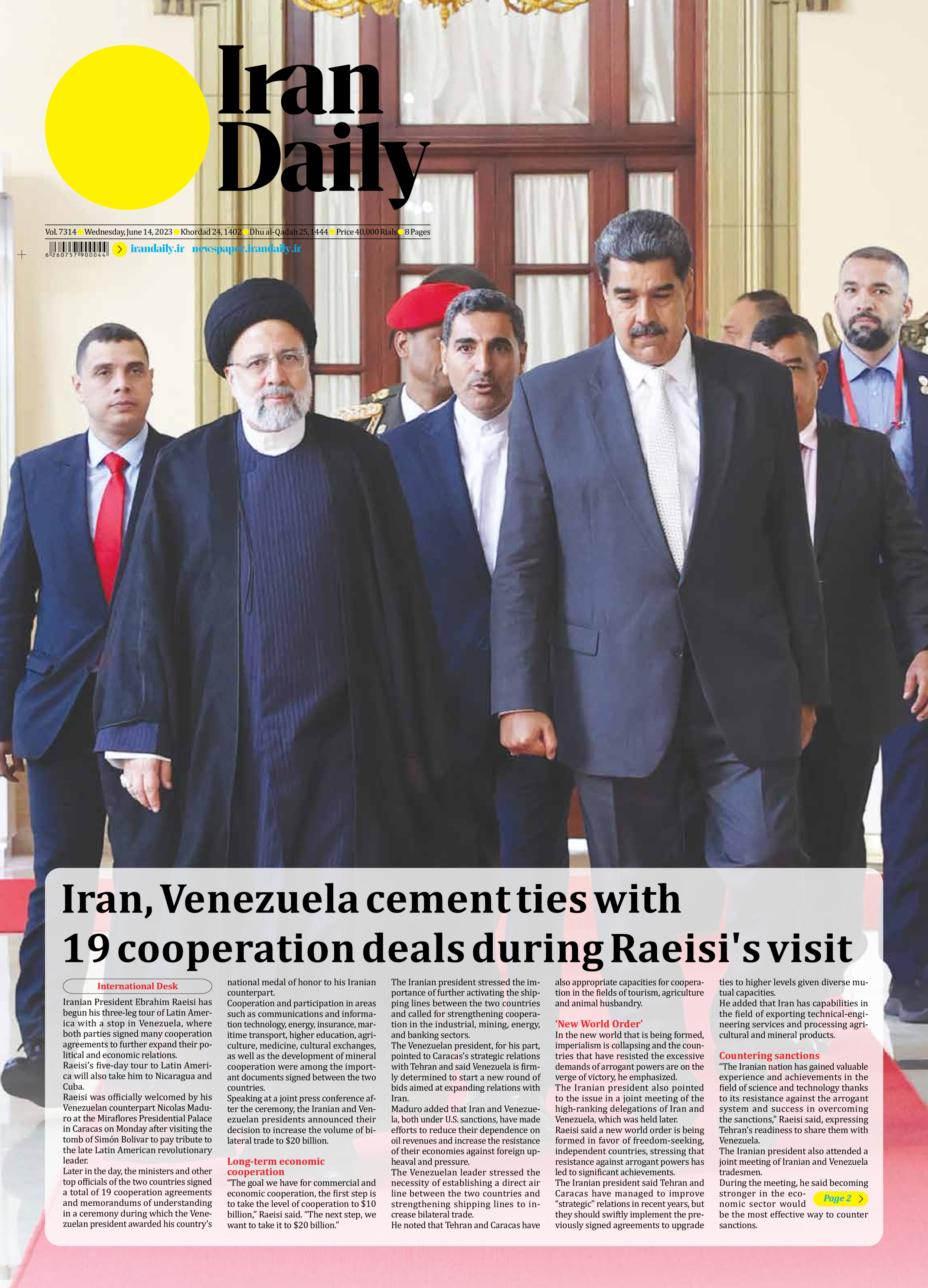
Iran, Venezuela cement ties with 19 cooperation deals during Raeisi’s visit
Iranian President Ebrahim Raeisi has begun his three-leg tour of Latin America with a stop in Venezuela, where both parties signed many cooperation agreements to further expand their political and economic relations.
Raeisi’s five-day tour to Latin America will also take him to Nicaragua and Cuba.
Raeisi was officially welcomed by his Venezuelan counterpart Nicolas Maduro at the Miraflores Presidential Palace in Caracas on Monday after visiting the tomb of Simón Bolivar to pay tribute to the late Latin American revolutionary leader.
Later in the day, the ministers and other top officials of the two countries signed a total of 19 cooperation agreements and memorandums of understanding in a ceremony during which the Venezuelan president awarded his country’s national medal of honor to his Iranian counterpart.
Cooperation and participation in areas such as communications and information technology, energy, insurance, maritime transport, higher education, agriculture, medicine, cultural exchanges, as well as the development of mineral cooperation were among the important documents signed between the two countries.
Speaking at a joint press conference after the ceremony, the Iranian and Venezuelan presidents announced their decision to increase the volume of bilateral trade to $20 billion.
Long-term economic cooperation
“The goal we have for commercial and economic cooperation, the first step is to take the level of cooperation to $10 billion,” Raeisi said. “The next step, we want to take it to $20 billion.”
The Iranian president stressed the importance of further activating the shipping lines between the two countries and called for strengthening cooperation in the industrial, mining, energy, and banking sectors.
The Venezuelan president, for his part, pointed to Caracas’s strategic relations with Tehran and said Venezuela is firmly determined to start a new round of bids aimed at expanding relations with Iran.
Maduro added that Iran and Venezuela, both under U.S. sanctions, have made efforts to reduce their dependence on oil revenues and increase the resistance of their economies against foreign upheaval and pressure.
The Venezuelan leader stressed the necessity of establishing a direct air line between the two countries and strengthening shipping lines to increase bilateral trade.
He noted that Tehran and Caracas have also appropriate capacities for cooperation in the fields of tourism, agriculture and animal husbandry.
‘New World Order’
In the new world that is being formed, imperialism is collapsing and the countries that have resisted the excessive demands of arrogant powers are on the verge of victory, he emphasized.
The Iranian president also pointed to the issue in a joint meeting of the high-ranking delegations of Iran and Venezuela, which was held later.
Raeisi said a new world order is being formed in favor of freedom-seeking, independent countries, stressing that resistance against arrogant powers has led to significant achievements.
The Iranian president said Tehran and Caracas have managed to improve “strategic” relations in recent years, but they should swiftly implement the previously signed agreements to upgrade ties to higher levels given diverse mutual capacities.
He added that Iran has capabilities in the field of exporting technical-engineering services and processing agricultural and mineral products.
Countering sanctions
“The Iranian nation has gained valuable experience and achievements in the field of science and technology thanks to its resistance against the arrogant system and success in overcoming the sanctions,” Raeisi said, expressing Tehran’s readiness to share them with Venezuela.
The Iranian president also attended a joint meeting of Iranian and Venezuela tradesmen.
During the meeting, he said becoming stronger in the economic sector would be the most effective way to counter sanctions.
He added that the Iranian youths have succeeded in turning sanctions into opportunities by making use of the capabilities of knowledge-based companies and maintaining peace and stability in the country against upheavals.
He noted that Tehran and Caracas have enormous capacities to increase economic exchanges, which have not been used yet.
The two sides agreed to remove customs, banking and tariff barriers in order to facilitate and accelerate economic exchanges, he noted.
Raeisi said Iranian ambassadors, commercial offices, the house of science and technology and all active sectors in the fields of industry, mines and banking affairs must work to facilitate mutual trade ties.
Iran and Venezuela, which have been targeted by illegal U.S. sanctions, have increased their economic and political relations in recent years, in a bid to counter the restrictions that have mainly targeted their oil exports.
Venezuela, which has the world’s largest crude reserves, has struggled in recent years to produce enough gasoline and diesel fuel due to refinery outages as a result of the sanctions.
Tehran has tried to help the country by providing crude and condensate as well as parts and feedstock for its refining network.
Last June, Iran and Venezuela signed a 20-year partnership agreement aimed at bolstering bilateral cooperation in various fields during Venezuelan President Maduro’s visit to Tehran.
The partnership agreement includes cooperation in the fields of science, technology, agriculture, oil and gas, petrochemicals, tourism and culture.







